
Today’s Tech Providers Need Conversational AI Tech Support Solutions
Technical support is complex. It requires talented staff, multiple touchpoints and a high-touch customer engagement experience. That’s a tall order for even the biggest tech companies to deliver on their own. With customer contract renewals worth thousands on the line, getting tech support right is critical. That’s why providers need conversational AI to deliver superior IT support.
Is your company considering adopting conversational AI for technical support? The best place to start is by analyzing each step of the tech support journey for friction points. Generally, there are three key phases of a typical technical support case that can be fraught with challenges:
Beginning of the Journey
Most companies offer some form of self-service to help customers solve their technical issues on their own. But without conversational AI, workplace support solutions are only marginally effective at best. That’s because many tech support issues are too complex for simple, rule-based self-service portals or FAQ bots. Consider this: only 9% of calls are resolved through self-service alone due to limited availability of an advanced self-service option that can address technical support issues.
The customer contacts support via chat, email or calling in.
The customer prefers the voice channel.

It takes over 10 minutes of waiting to reach support.
Problem Discovery
Does this sound familiar: technical support spends too much time trying to understand complex support calls. That’s the reality for tech companies without conversational AI tech support solutions in place. Without assistance from artificial intelligence, tech support staff must rely on manual tools and their know-how to diagnose complex customer problems. It’s a time-consuming and often inaccurate process that frustrates agents and customers alike.

Tech Support asks a number of questions to diagnosis the problem in order to prescribe the right solution.
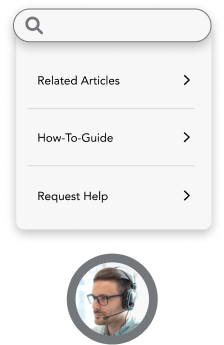
Tech support struggle to manually access the information they need.

Tech support does not have the tools needed to understand the customer’s intent.
Problem Resolution
Even simple tech support issues can grow into major headaches without the right tools to get the job done. Manual knowledge bases, high-effort protocols and memory-based troubleshooting can slow problem resolution to a crawl. As agents struggle to solve customer issues, morale suffers, and customer churn follows. But it doesn’t have to be that way. With today’s conversational AI tech support tools (more on that below), your tech support operations don’t have to look like this:
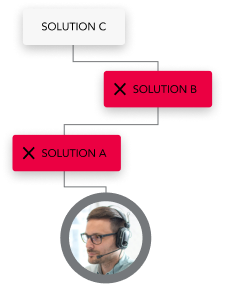
Tech support walks the customer through a number of remedies for their problem until resolved.
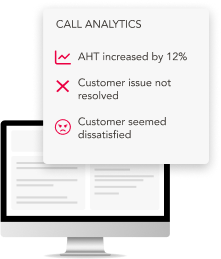
It can become a complex and time-consuming process to resolve each case.
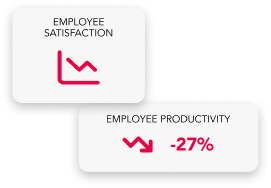
Tech support teams can become overwhelmed and disengaged throughout the process.
The Challenge (and How to Fix it with Conversational AI for Customer Support)
$80
Average Cost Per Case
The high turnaround time for each case gets costly; and with thousands of cases, companies can suffer huge losses in revenue.
70%
Managing Customer Satisfaction
70% of B2B buyers1 point to real-time, always-on customer service as one of the key factors in boosting customer loyalty.
41%
Employee
Attrition
IDC Profiles Uniphore’s Unique Approach to Enterprise-Scale AI
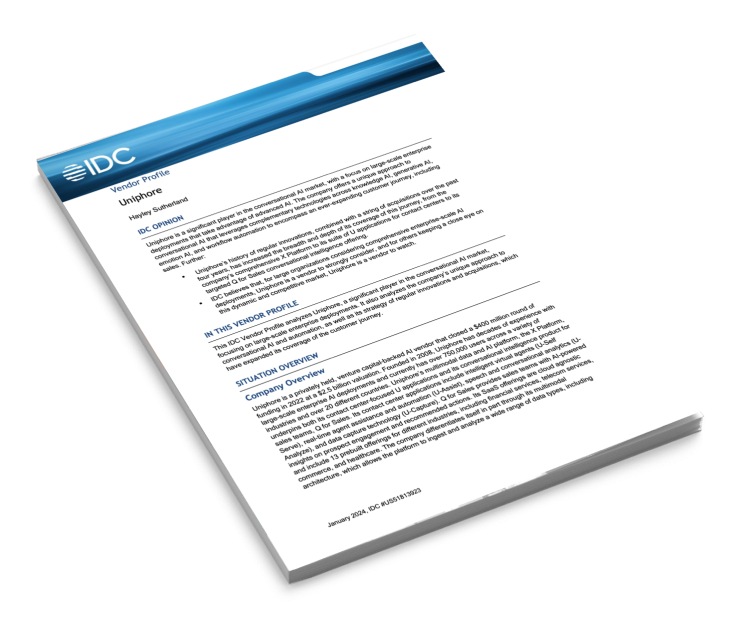
Tackling Cost Per Case with Conversational AI
Working with customers in the B2B technical support space, Uniphore has collected data on the relationship between case complexity and cost. Understanding this dynamic is critical to reducing cost per case while still prioritizing the customer and employee experience. That’s where conversational AI for tech support comes in: by reducing complexity through artificial intelligence, tech support providers can drive down their cost per case—for every case that enters the workplace.
We’ve found that, on average, the case volume can be organized into four categories. As these categories increase in complexity, they require more time and resources.
Getting Started with Conversational AI
STEP 1
Categorize your cases
As a first step, we recommend companies identify the percentage of calls that fall within each category.
Routine CaseQuick Problem Diagnosis & Resolution
Less than 30 minsDetailed CaseMulti-Stage Problem Diagnosis & Quick Resolution
Under 3 hoursIntermediate CaseMulti-Stage Problem Diagnosis & Resolution
Average of 5 daysComplex CaseDifficult Problem Diagnosis & Resolution
Average of 20 daysNeed help categorizing your cases? Our U-Analyze solution that can help you classify and understand the types of interactions that cause the most volume. Using advanced conversational analytics, this conversational AI workplace support solution analyzes 100% of all calls, texts and emails to better understand and identify each case.
Using cutting-edge AI and natural language processing (NLP), Uniphore’s conversational analytics tool, U-Analyze, uncovers rich insights into every tech support interaction across every channel. Surface trends and topics driving customers to reach out and identify friction points along the path to resolution. Download the datasheet to learn more.
Tech Support Optimization with Uniphore
Creating a superior customer service experience is the end goal. By leveraging the power of AI and automation, every step of the customer journey can be optimized.
STEP 2
Test and Repeat
Take one case category at a time and apply one of the recommended solutions below.
AI-Powered Self Service
Routine cases are an excellent starting ground for deploying conversational AI for customer support. As a first line of defense, deploy intelligent voice and chatbots that can handle routine cases. U-Self Serve is more than a FAQ bot. It can provide a human-like experience by understanding what is being asked (without “pre-canned” words) and offering the best advice by connecting to your knowledge management system.
Expected Impact
Increase self-serve adoption by 35% and reduce tech support case volume by 10%.
Real-Time AI-Powered Agent Guidance
As call complexity rises, your conversational AI tech support tools need to keep pace. Your technical support teams deserve a knowledge guide that can accelerate case diagnosis and automate time-consuming administrative tasks associated with supporting a case. U-Assist provides real-time in-call alerts and automatically captures promises made and summary notes on behalf of the technical support team.
Expected Impact
Reduce overall time to diagnose by 12-15% through In-call tech support alerts, guidance and automation of data entry tasks.
Reduce case handling time by 25-30% through automation of case categorization, summary notes and promise management
Optimizing Tech Support with Conversational AI Tech Support
Creating a superior customer service experience is the end goal for every tech support provider. By leveraging the power of automation and conversational AI for customer support, tech companies can optimize every step of the customer journey.
Beginning of the Journey
Don’t wait until further along the resolution journey to apply conversational AI for customer support. Start at the first point of contact. Here, conversational AI tech support tools can capture customer input to quickly categorize calls and automate subsequent tasks and actions—including routing calls to the appropriate tech support.
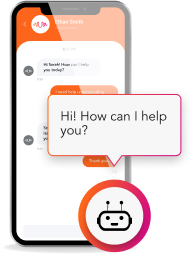
Prioritize self-service to handle low-complexity cases that can be resolved quickly.
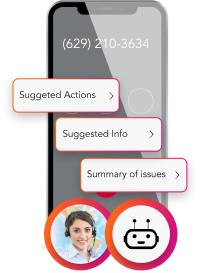
Guide tech supports with alerts for entitlement, auto-recommend knowledge, relevant SDI content and more using U-Assist in-call.

Slash lengthy call times—and improve customer satisfaction—by eliminating manual friction points.
Problem Discovery
With conversational AI, tech support teams have the tools and information they need to diagnose complex problems when they need it most—during live customer interactions. This includes surfacing relevant knowledge articles and customer history information that can impact the current case. And workflow automation, tech supports can focus on the problem at hand rather than the litany of mundane tasks that prolong calls and sap productivity—a win-win for customers and tech supports alike.

Leverage workflow automation to streamline case creation and remote support.
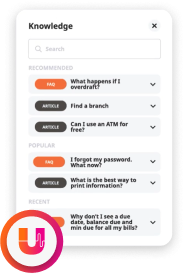
Ensure your team has access to the most up-to-date information to drive better support and customer outcomes.
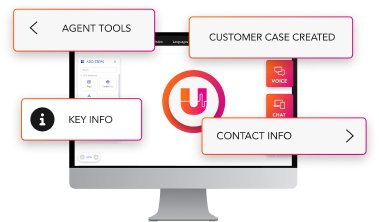
Track all interactions with a unified system that serves as a “single point of truth” for future cases.
Problem Resolution
With conversational automation for customer support, tech companies can eliminate many of the pain points that paralyze resolutions and ultimately drive customer—and tech support—churn. Using data captured earlier in the journey, conversational AI tech support solutions, like U-Assist, can guide tech supports toward next-best actions that speed up—and de-stress—resolutions. At the same time, workflow automation eliminates repetitive, administrative tasks—like data entry and quality assurance—to improve compliance, notation and call summary accuracy—all of which can make resolving future cases easier.

Empower your technical support team to be more productive and focus on reducing the time on each case.
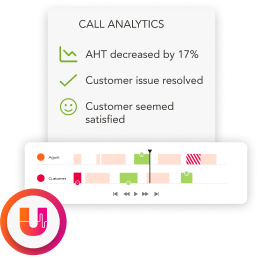
Automate after-call work, like call summary generation, and analyze performance metrics for improvement opportunities.
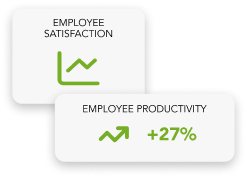
Heighten employee morale and engagement by empowering tech supports to be their best.
Choosing the Right Partner for Conversational AI
When it comes to conversational AI tech support solutions, not all vendors are created equal. Look for a partner with extensive experience in the IT tech support space. When evaluating solutions, make integration with your existing systems and software a priority. (You shouldn’t have to start from scratch to deliver a world-class customer experience.)
Offering a fully integrative, unified platform for self-service, tech support assistance and interaction analytics, Uniphore’s revolutionary X-Platform enables tech support providers to understand and resolve customer issues with unparalleled speed and accuracy. Powered by the next generation in conversational AI, our solution empowers tech supports with the latest in intent recognition, data extraction and workflow automation to make quick work of complex cases.
Want to Learn More About Enterprise AI for Customer Support?
Learn how you can improve your tech support services with Enterprise AI by Uniphore.
AI & Automation in Action
B2B Tech Support: How to Do It Right | Uniphore
Need help with B2B tech support? Don't get overwhelmed - this blog post will walk you through the process step by step to ensure you do it...
)